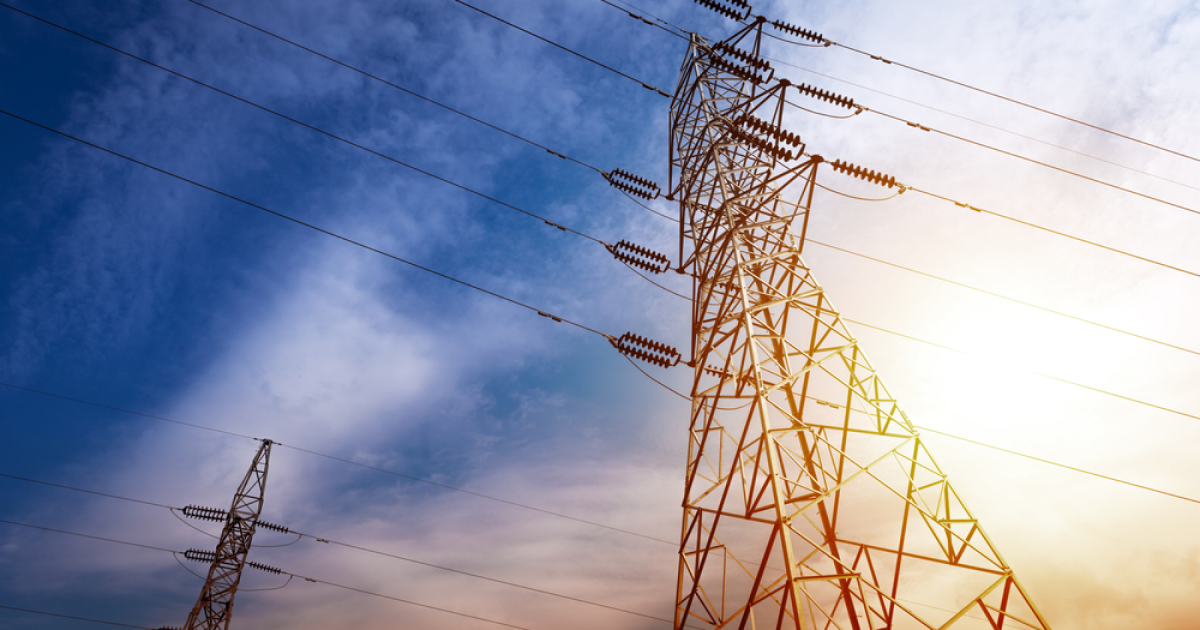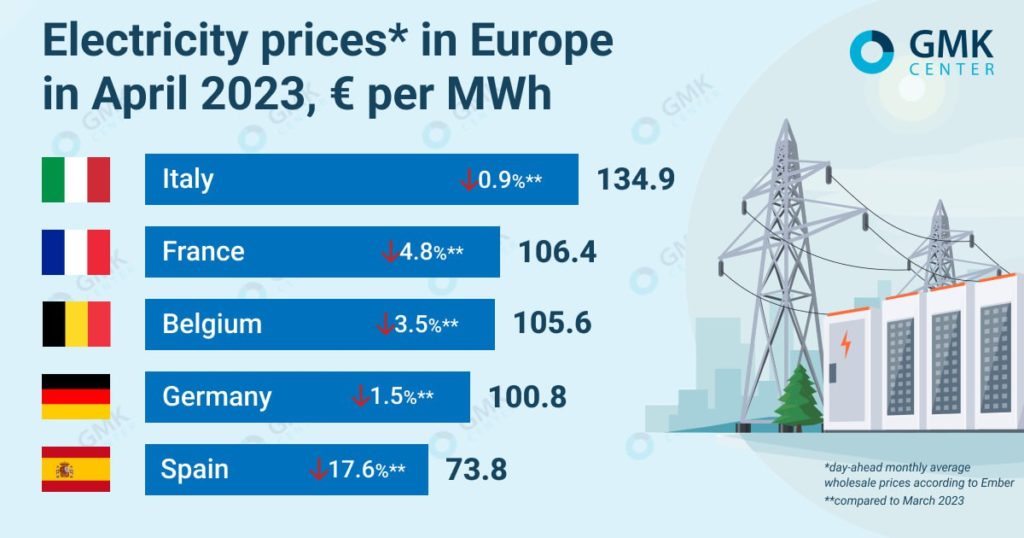
News Global Market electricity prices 3900 11 May 2023
In April 2023, the average monthly day-ahead price in most countries was below €110/MWh
In April 2023, the average monthly day-ahead price of electricity in most European countries was below €110/MWh (exception – Italy and the UK).
In the EU, average monthly wholesale prices for the day ahead, according to Ember, in April were:
- Italy – €134.9/MWh;
- France – €106.4/MWh;
- Germany – €100.8/MWh;
- Spain – €73.8/MWh;
- Belgium – €105.6/MWh.

Electricity prices in the EU in April, GMK Center
In the UK, according to Nordpool, the monthly average day-ahead spot price in April was €116.1/MWh.
According to AleaSoft Energy Forecasting’s analysis, in April the decrease in electricity prices in European markets, both in comparison with March and April 2022, occurred amid falling average gas prices, reduced demand and increased solar energy production. In addition, it was helped by an increase in wind power production in France last month (+11% year-on-year), while it decreased in the rest of the countries.
The demand for electricity in April 2023 on the European markets fell both year-on-year and compared to March. In particular, in Spain it decreased by 10% y/y, in France – by 5.3%. Higher temperatures compared to the previous month and Easter holidays contributed to this.
Germany. An important event on the German energy market in April was the shutdown of the last three operating nuclear power plants in the country – Isar 2, Neckarwestheim 2 and Emsland. Critics of this move consider it irrational to lose sources of low-carbon energy production. They indicate that fossil fuels will fill the gap. Instead, authorities say the country’s energy security is under control thanks to full gas storage, new LNG terminals on the country’s northern coast and renewable energy.
Last year, Germany provided about 6% of its electricity consumption through cheap nuclear power generation. Replacement of these volumes will be a challenge for the country.
In May, a new debate broke out in Germany. At the beginning of the month, the country’s Ministry of Economy proposed to reduce the price of electricity for energy-intensive industrial sectors and industries that are crucial for the green transition. According to the released plan, 80% of their electricity needs should be met at a subsidized price of 6 cents per kWh. It is proposed that the measure should be in effect until 2030, it could cost €25-30 billion.
According to recent data from the energy lobby group BDEW, writes Bloomberg, small and medium-sized businesses in Germany pay about 27 cents per kWh. Large energy-intensive companies do not usually make their exact pricing systems public.
The Ministry of Economy offered to finance the tool from the extrabudgetary fund created to help companies during the pandemic – it was repurposed during the energy crisis. The Minister of Finance Christian Lindner opposed this and suggests turning to the climate and transformation fund, which is already in short supply. In general, the Ministry of Finance believes that there are currently no funds for this project.
The German Chancellor Olaf Scholz also criticized the initiative – he believes that long-term subsidies are not useful for the economy. In addition, the plans of the Minister of Economy Robert Habek caused criticism from the vice president of the European Commission Margrethe Vestager.
To prevent richer EU member states from providing large subsidies to their industries, the bloc strictly regulates state aid rules. However, Habek’s ambitions, according to Euroactiv, go further. He wants the EU to step in to ensure that all countries in the bloc, regardless of their financial capacity, can afford a special electricity tariff for industry – through a temporary special program, the European Bridge Electricity Prize, or joint loans similar to Europe’s SURE credit program.
France. At the end of April, the Minister of Finance of France Bruno Le Maire in an interview for LCI said that restrictions on the increase in electricity prices in the country will remain in force after 2023 – they will most likely be abolished by the beginning of 2025. In his opinion, electricity prices have not yet normalized.
Later Roland Lescure, the minister-delegate, clarified that the electricity price shield will not be extended for companies, reports La Tribune.
“Electricity and gas have dropped a lot. […] That’s why companies don’t need help today,” Lescure said on France 3, which contrasted with Le Maire’s statement.
However, the chance for business support has not been lost yet. Lescure reminded that the current system is still in effect, and the situation will be reviewed in the fall of this year.
The tariff shield was introduced in the country in the fall of 2021. At the beginning of this year, its effect was extended until the end of 2023. This system made it possible to limit the growth of the regulated electricity tariff to 4% in 2022 and 15% in the current year.
Gas. The gas storage capacity of the EU countries remains high. According to the AGSI platform, as of May 1, 2023, this indicator was 60% in the EU as a whole. At the same time, EU countries are obliged to fill gas storage facilities by 90% by November.
On May 10, the European Commission announced the first international tender for the joint purchase of gas within the EU Energy Platform. 77 companies have requested the purchase of 11.6 billion cubic meters, 2.7 billion cubic meters of which are liquefied natural gas (LNG). The tender was launched on the AggregateEU platform.
According to the EC website, international gas suppliers, with the exception of the Russian Federation, are invited to participate in this tender by submitting applications by May 15. The first round of the tender covers the supply of gas from June 2023 to May 2024.
“With AggregateEU, we have created a new marketplace in Europe, which will increase our energy security ahead of the next winter and help fill our gas storages. This is also an opportunity for international gas suppliers to expand their customers’ base. This is a win-win exercise,” said the vice-president of the European Commission Marosh Shefchovych.
Joint gas collection by the EU gas was introduced in response to the energy crisis caused by the war in Ukraine. In particular, the scheme is aimed at improving access to the gas market for small companies and curbing energy prices for energy-intensive industries.




